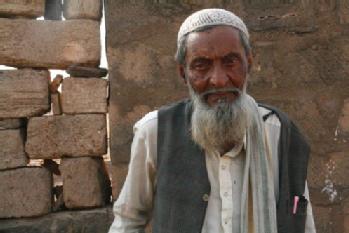Osman Abdulla Bhatti
|
Age: 85 Occupation: Retired cutler Education: Class 3 Place of residence: Roha Date of interview: 17/02/12.
|
 |
Interview Summary
Osman (or Usman) Bhatti, a veteran knife maker, patiently explained the process involved in his craft. The knives are made in various stages: firstly, iron is melted and moulds are prepared to shape (faro) the blade. For the handle, both traditional and modern tools are used. Local instruments including the hathodo (hammer), hambori (holder), shran (for brushing) and dori (thread, for hand drilling) are still in vogue. Rough versions of the knives are made initially, and according to Osman, two workers can make twenty-four pieces in a day. The following day, the rough versions are polished to create the finished product.
The knives are made of various colours, sizes and shapes, with attractive carved handles. In earlier times, the knife handles were made of buffalo horn, procured either locally or from elsewhere in Gujarat. More recently, fibre technology has replaced horn and nylon is the primary material for Osman’s handles. Working as an ironsmith is, of course, fraught with risk, especially during the process of shaping the knife blade. Though Osman himself has never been hurt, his sons have incurred minor injuries.
Wholesale merchants from Bhuj and Anjar purchase Osman’s knives in bulk. These merchants then supply them to metro cities, especially Mumbai. Osman’s profit is low: around two rupees per knife. He is never paid in advance for the work and most of the time his family have to travel to Anjar to sell the product to the wholesaler themselves. In Anjar, the brand name K. N. Anjani is particularly popular and is marked in most of the knifes made in Roha.
Osman’s ancestors also worked in the same business; indeed the family surname Bhatti signifies one who works with a smelting altar. Osman himself started working around the age of ten and continued for around sixty years. Now, his seven sons and some of his grandsons are also knife-makers. The women in his household do not follow the profession and instead are involved in bandhani.
